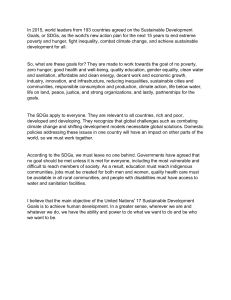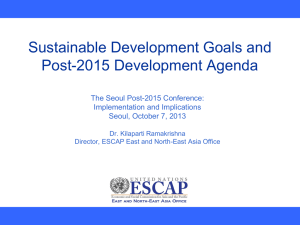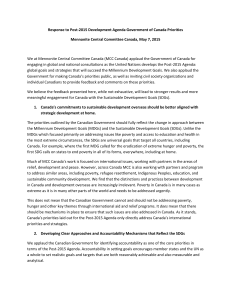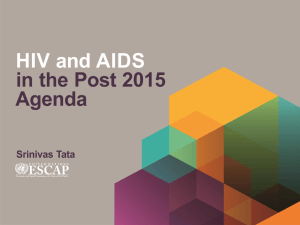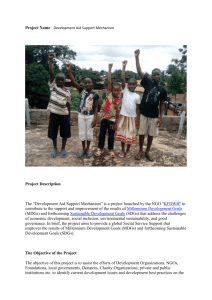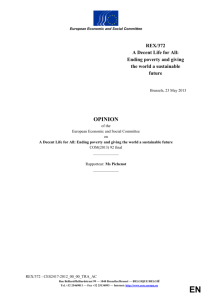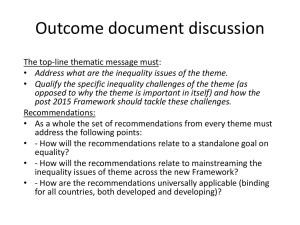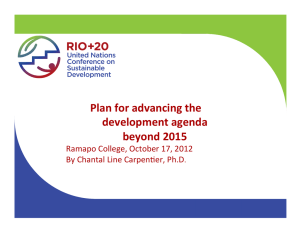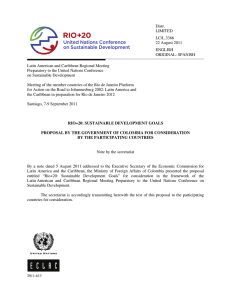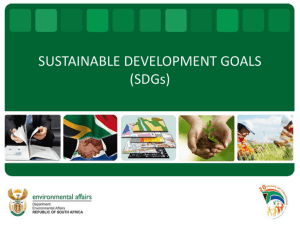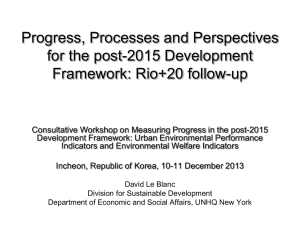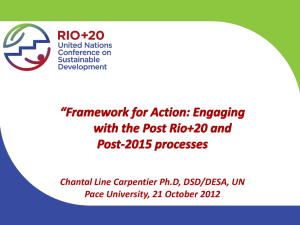1. Procedure
advertisement
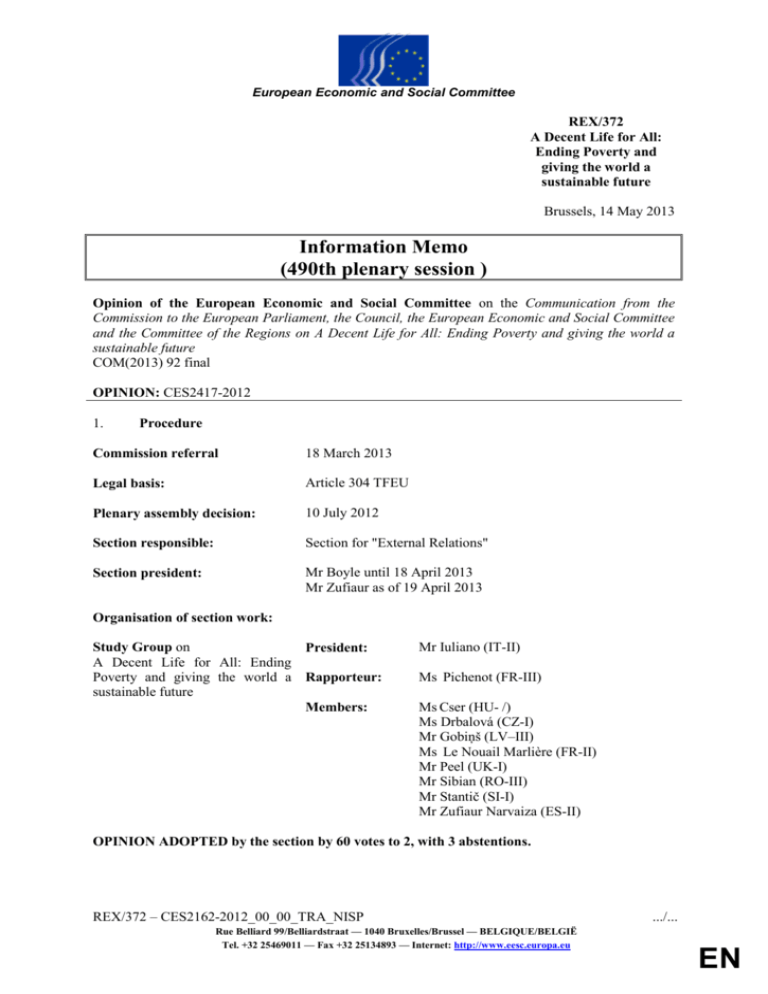
European Economic and Social Committee REX/372 A Decent Life for All: Ending Poverty and giving the world a sustainable future Brussels, 14 May 2013 Information Memo (490th plenary session ) Opinion of the European Economic and Social Committee on the Communication from the Commission to the European Parliament, the Council, the European Economic and Social Committee and the Committee of the Regions on A Decent Life for All: Ending Poverty and giving the world a sustainable future COM(2013) 92 final OPINION: CES2417-2012 1. Procedure Commission referral 18 March 2013 Legal basis: Article 304 TFEU Plenary assembly decision: 10 July 2012 Section responsible: Section for "External Relations" Section president: Mr Boyle until 18 April 2013 Mr Zufiaur as of 19 April 2013 Organisation of section work: Study Group on President: A Decent Life for All: Ending Poverty and giving the world a Rapporteur: sustainable future Members: Mr Iuliano (IT-II) Ms Pichenot (FR-III) Ms Cser (HU- /) Ms Drbalová (CZ-I) Mr Gobiņš (LV–III) Ms Le Nouail Marlière (FR-II) Mr Peel (UK-I) Mr Sibian (RO-III) Mr Stantič (SI-I) Mr Zufiaur Narvaiza (ES-II) OPINION ADOPTED by the section by 60 votes to 2, with 3 abstentions. REX/372 – CES2162-2012_00_00_TRA_NISP Rue Belliard 99/Belliardstraat — 1040 Bruxelles/Brussel — BELGIQUE/BELGIË Tel. +32 25469011 — Fax +32 25134893 — Internet: http://www.eesc.europa.eu .../... EN -2Expert Mr Olivier Consolo – CONCORD (rapporteur's expert) 2. Background On 19 December 2012 the REX section started work on an own initiative opinion on Achievements and future prospects of the Millennium Development Goals: input from civil society. This opinion was intended to contribute to the EU's position on the post 2015 development agenda. In the course of the following months, the Commission decided to bring together their work on the post 2015 development agenda on the one hand and on the Rio+20 follow-up work on the other hand and published a single Communication A decent life for All: ending poverty and giving the world a sustainable future COM(2013) 92 final prepared by DG DEVCO and DG ENVI together. Further, the Irish EU Council Presidency scheduled the adoption of Council conclusions on this communication for June 2013, right in time before important meetings related to the post 2015 and the Rio+20 follow-up process take place at UN level in Autumn 2013. It was agreed that the EESC opinion would then not only take stock of the achievements of the Millennium Development Goals (MDGs) and contribute to the process which will lead up to the development of the Sustainable Development Goals (SDGs), but also respond to the above Commission Communication. A referral opinion would also be well timed to contribute to the Council Conclusions of May/June 2013 which will express the EU position for participation at the High Level event at the UN General Assembly scheduled in September 2013. 3. Gist of the section opinion The opinion takes into account the EESC experience in development cooperation, the work of the Sustainable Development Observatory (SDO) and the contributions to the EU consultations carried out by the European Commission, Directorate General for Development and Cooperation Towards a post 2015 Development Framework and the Directorate General for the Environment Ensuring Sustainable Development Globally: EU Follow Up to Rio+20. A convergent and inclusive process The Committee considers that the European Commission's communication constitutes an important milestone, contributing to the debate in the institutions and in the Member States. It particularly welcomes the concerted work being done by the European Council, and encourages the latter to produce a single conclusions document at the Foreign Affairs Council of May/June 2013. The Committee calls on the EU to make its voice heard in international forums on the basis of this framework for convergence of the MDGs/SDGs. Each country, with the participation of civil society, will need to draw up an inclusive national development strategy, taking account of its starting level, thus participating in the achievement of the common SDGs. The Committee considers that this will require procedures for assessing and monitoring national commitments, which should be recorded in a global register, with improved statistical indicators complementing GDP. In the European Union, the SDGs, designed as universal objectives, must be translated into European policies and national reform programmes in the Member States. This aspect should be included in the preparation of the mid-term review of the Europe 2020 strategy in accordance with the follow-up to the Rio+20 commitments. REX/372 – CES2162-2012_00_00_TRA_NISP .../... -3- A participatory process open to civil society The Committee calls on the Commission and the Member States to involve civil society throughout the process of drafting, and then implementation and monitoring, particularly with regard to the SDGs, and in national debates as well as in debates between European civil societies and those of partner countries. National debates will be part of the preparations for the European Year for Cooperation and Sustainable Development in 2015 with the aim of building a shared vision of a future world and make the purpose of European external action clearer to the public. Civil societies have a role to play in putting the case for a new economic model with the aim of decoupling the level of economic activity from that of human development and of the environmental impact. To this end, the Committee recommends setting up a multi-stakeholder consultative forum1dedicated to promoting sustainable production and consumption in the EU. The integration of social dialogue between the social partners should be an essential instrument for implementing, monitoring and assessing the MDGs/SDGs. Further, south/south cooperation, and cooperation based on voluntary objective-related contracts between actors which are binding at all territorial levels could be encouraged to take account of the multi-dimensional aspect of poverty. The future prospects of a post-2015 agenda The post-2015 agenda represents a change in mind-set which moves beyond international aid and cooperation and must be seen as a process which commits all countries to the transition to an inclusive and green economic model on the path towards a decarbonated economy. A definition of SDGs must strike a balance between the three dimensions of sustainable development and requires that global public goods be preserved by global public policies, managed by an international community of sovereign states and with great coherence between international institutions and global policies. The Committee regrets that the Communication insufficiently addresses financing and considers that the forthcoming communication on financial resources scheduled for June/July 2013 should include proposals to ensure that adequate sources of financing will be made available to combat poverty. The European financial transaction tax to be put in place in 2013 and extended to all G20 members. Further, the Committee stresses that there should be no interruption in the implementation of development policies and urges the Union and the Member States to maintain their commitments and to ensure that the 0.7% average target is reached when the new phase begins. _____________ 1 EESC exploratory opinion on The promotion of sustainable production and consumption in the EU, rapporteur Ms Le Nouail Marlière, OJ C 191 29.6.2012, p. 6–10. REX/372 – CES2162-2012_00_00_TRA_NISP
